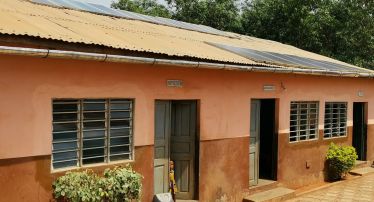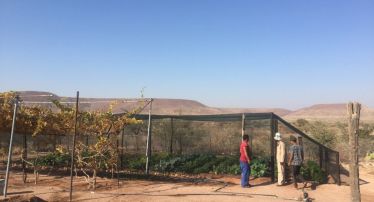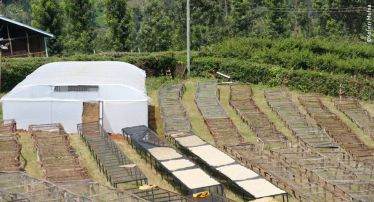The Small Projects Fund
Expectations were exceeded with the large number of applications received with innovative solutions. Small-scale projects supporting access to renewable energy can be a decisive factor for the development of rural areas because they can be designed for communities‘ specific needs. The more tailor-made, the better. While the Small Projects Fund is no longer accepting applications, you can find out how we selected the projects and how we support them through their implementation.
The Green People’s Energy Small Projects Fund (KPF) provides financial support for project ideas from non-profit organisations in the field of decentralised renewable energy. Since the beginning of December 2018, we have been looking for sustainable project ideas for locally needed solutions in sub-Saharan Africa. We completed this evaluation process as part of our final decision round on December 1, 2021, thus exhausting the fund.
Funded projects
Our balance – 314 project proposals evaluated, going beyond objectives
During our three-year term, we have received a total of 314 project applications, some with extremely innovative ideas, from about 30 African countries. The number of applications has exceeded our expectations. It underpins the urgency of our project.
We selected the projects to be funded in a transparent process, reviewing the applicants and their project ideas according to strict technical and administrative criteria. At the end of its tenure, the Small Projects Fund will exceed the target of 35 funded small projects: 41 projects have ended their implementation, while 10 are still being implemented.
In the course of the selection process, we prioritised solutions from the nine focus countries of the Green People’s Energy Initiative. These countries include: Ethiopia, Benin, Ghana, Mozambique, Namibia, Zambia, Senegal, Côte d’Ivoire and Uganda. In addition to these, we also support projects in countries with a GIZ country office or energy programme; in Cameroon, Kenya, Malawi, Mali, as well as Togo.
Our work at a glance
The selection procedure
Priority was placed on applications which focused on sustainable energy solutions for local needs, especially in rural areas. A decision-making committee consisting of representatives of the Federal Ministry for Economic Cooperation and Development (BMZ), two BMZ Energy Officers for Africa and team members of Green People’s Energy (GBE) analysed each application for potential social, ecological and economic impacts.
It was particularly important that the projects could continue beyond the funding period without continued support. In the course of the standard procedure, a clear majority of 71 percent of applications received proposed solar-based energy projects. In addition to the content requirements for the project applications, the applicants had to meet clearly defined administrative requirements.
In order to be able to process applications more efficiently and to support a diversity of project ideas in line with our funding objectives, we developed a second selection procedure, the so-called Challenge Call. This was implemented in parallel to standard procedure described above.
Compared to our standard procedure, the Challenge Call procedure can be understood as a more competitive tender format. For this purpose, we identified two specific challenges in the field of energy access, of which the applicants had to address at least one in their project: „Increasing the sustainability of off-grid systems“ and „Reducing CO2 emissions through energy access.” Applicants also had to meet additional administrative criteria and apply through the virtual platform. Although the process only covered the period from July 19 to September 5 2021, we received 141 applications from 27 countries in the Challenge Call process.
The project stages
In total, the decision-making body met for 13 funding rounds. In preparation for this, the projects were evaluated in terms of content and form. After selection for funding, the project outlines were finalised in terms of content and administration in cooperation between the applicants and the Small Project Fund team according to need. A contract was then concluded with the organisations. The projects began following successful completion of this process.
The implementation phase for each project can last up to two years. During this time, support for the projects and the organisations behind them remains essential. This includes technical and administrative support from us, GIZ colleagues on the ground, or from external experts. We are currently supporting a total of 10 ongoing projects. A summary of their individual challenges, goals and approaches can be found in our project profiles.
During the implementation phase, the project officers write semi-annual progress reports for the Small Projects Fund. These serve not only to identify potential problems at an early stage, but also to distil valid information from them. We feed the lessons learned into guides for organisations and local networks so that they can learn from the experiences of others and avoid mistakes.
Our goals
In addition to the large number of applications, the selection results have also highlighted the importance of tailor-made solutions and the need for further funding for such small-scale projects. Despite their financial “small” scale, such projects can provide powerful leverage in rural regions by initiating local solutions with the help of renewable energies.
Our work focuses on the long-term needs of the people within the rural communities and the sustainable development of the project. Because of this, it is essential for us to consult applicant organisations from a perspective that goes beyond the project’s duration. Often, projects combine two or more issues and create synergies to make the best use of the potential of renewable energy. For example, the implementation of solar systems not only improves general decentralised power supply, but also the situation in a health facility or school in the same course. Such a holistic, community-promoting focus is important for the impact of the small project fund.
We want to help project partners build their capacities and competencies with regard to renewable energies and create sustainable administrative structures. This is because renewable energies and the transfer of the associated knowledge are an important key to sustainably improving the living conditions of the rural population in rural sub-Saharan Africa. Energy can be used productively. Local value added can be created. And social infrastructure can be improved.





